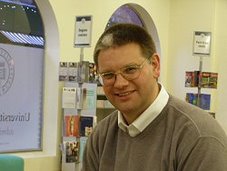So - two weeks in and several thousand interviews later, where are we at with admissions to Oxford for October 2007 entry? To answer this question, I took a trip to one of the Colleges I had visited last week to talk to one of the (many) unsung heroes of the admissions activity, a College Admissions Secretary.
When I arrived (late on Thursday morning) she was in the process of printing out several hundred letters that were due to be sent by first class post on Friday of this week, indicating which candidates had received an offer, and which were unsuccessful. Prior to the start of the print-run, the various subject boards and interview tutors had met to compile a final list of those which they wished to admit. All of the results from the interviews, along with the marks from the tests and practical exercises that the candidates had taken had been fed into the discussion, and in each case a group of those to whom an offer would be made had been identified.
One of the particular facets of the Oxford (and Cambridge) admissions systems is that it is the individual colleges that are responsible for their admissions decisions, not the University.
The University of Oxford is responsible for the award of the degree - the Colleges were established (from 1249 onwards) to provide the tutoring (and also accommodation) to enable students to then take the examinations that led to the award of the University qualification. It is therefore critically important that candidates receive the appropriate letter indicating the decision of the College relating to their individual application.
In this College the letter of admission, which also sets down any conditions that the student still needs to meet to be fully accepted (typically three A-grades at A-level, or equivalent) also includes a great deal of supplementary information.
The Admissions Secretary believed that much of the content (on issues such as when student accommodation would be allocated, costs, and recommended reading lists) would be more likely read by the candidate's parents or guardians, but she felt it important that the initial letter contained as much detailed information as possible, and also set out for candidates the calendar of future contact that would occur between the student and the College up until October 2007. (For example the College organises a weekend visit for the new intake in February 2007 to allow them to meet with existing students and begin the process of familiarising them with the College environment). Every year she reviews all of the information and amends it in the light of the queries that she received from the previous admissions cycle.
Typically one in four of those students who apply each year to Oxford receive an offer of admission. For those who are not successful, they will also receive written confirmation of their situation from the College, usually prior to the end of December. For many applicants (who are usually academically very capable, and have a wide range of interests, often exhibiting significant responsibility in roles that they have within their school, colleges and/or local community) receiving a letter from the University that indicates that they have not obtained an offer can be the first point in their life that they have experienced a significant setback.
To attempt to provide some useful feedback, each candidate's school or college will (where requested) be sent a letter from the College (usually between January and late February) which provides feedback upon the candidate's performance and indentifies their strengths and weaknesses. It is also for this reason that the national admissions system co-ordinated by the Universities' and Colleges' Admissions Service (UCAS) allows an applicant up to five other choices (four additional choices from 2008 entry) to provide alternative options.
The Admissions Secretary was very concerned to ensure that the material was accurate, so two colleagues, including the College's Senior Tutor, were checking each individual letter before they were sealed in the envelope prior to being posted.
By the time you read this, those of you who have applied to Oxford this year may already have learned of the outcome. For anyone applying this year (whether to Oxford or elsewhere) I wish you every success in your future studies.
Mike Nicholson
p.s. I hope that you have found this set of entries to be illuminating, interesting and possibly even entertaining. Those of you who pay particular attention to the time of posting will note that as the weeks have progressed the time that the blog has appeared has got progressively later, as I have struggled to find the time to fit this into my daily routine. For that reason, I feel that it would be difficult for me to continue with a daily blog. It is clear from some your posts that the content, and possibly the perspective that I can bring because of my role at Oxford, has added some value to the activity however, and I therefore intend to have a break for the next few weeks, but return in the New Year with a weekly blog that will pick up either on an Oxford or national admissions topic. Expect the first post of 2007 sometime around the 12th January.
